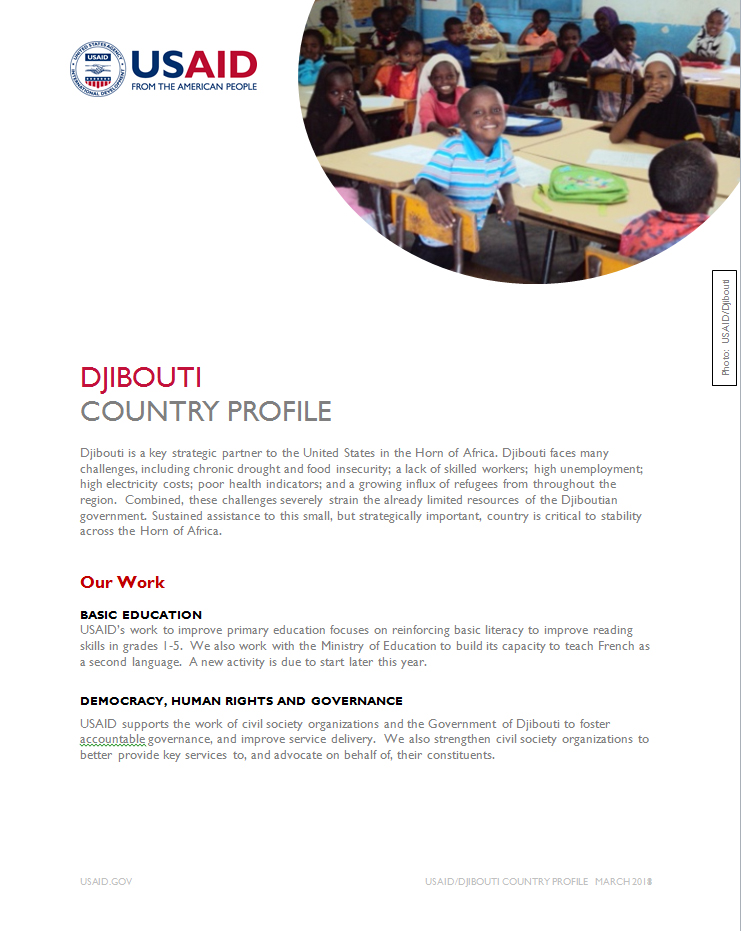Speeches Shim
Djibouti Country Profile ![]() (pdf - 138k)
(pdf - 138k)
Introduction
Djibouti is a key strategic partner to the United States in the Horn of Africa. USAID reestablished its office here in 2003 and has since provided development assistance for basic health services, basic education, and democracy and good governance. With the growing importance of the US/Djibouti relationship and given tremendous need, USAID is also planning various new Economic Growth initiatives in partnership with the government of Djibouti (GoDj). Djibouti faces many challenges, including chronic drought and food insecurity; a lack of skilled workers; high unemployment; high electricity costs; poor health indicators; and a growing influx of climate change refugees and Yemeni refugees. Combined, these challenges severely strain the already limited resources of the Djiboutian government. Sustained assistance to this small but strategically important country is critical to its prosperity and to stability across the Horn of Africa.
Programs
Health: Total Funding- $12,663,000 (FY2007-FY 2017)
All but three of the 34 rural health clinics in the country were constructed by the USG (23 by USAID and 8 by the US military), and the Ministry of Health has agreed to ensure that the clinics are staffed and supplied on an ongoing basis. Djibouti received its first allocation of President’s Emergency Program for Aids Relief funds, for HIV/AIDS prevention starting in 2011. Since then, Djibouti receives an annual allocation of approximately $1.5 million to assist GoDj in reducing HIV transmission among key and priority populations. USAID is currently working to strengthen the Ministry of Health’s and CSOs’capacity to deliver effective, high-quality HIV/AIDS prevention services, to eradicate polio and to ultimately assume program ownership.
Education: Total Funding - $22,925,436 (FY 2007-FY2017)
In FY 2010, USAID launched a four-year education program assisting the Ministry of Education to develop a national teacher-training plan; the program trained over 1,200 primary-school teachers. To promote the education of girls in primary and middle schools, USAID partners revised textbooks for gender neutrality, and developed a mentoring program for girls. USAID also supported Parent-Teacher Associations; provided small grants to establish a dozen school libraries; strengthened governance in over 100 school management committees; helped produce the Ministry of Education’s Annual Statistics Manual with improved data and graphics; and provided job training to 120 out-of-school youth (half of whom were women). USAID/Djibouti has designed a follow-on basic education project to address reading deficiencies in primary education. In addition to improving reading instruction, the project will also enhance community participation in early grade reading and improve the policy environment to support evidence-based reading instruction.
Djibouti Reading Analysis: A precursor of the Basic Education project, this activity has been completed and the final results of the four studies of Djibouti’s educational system have been used to design a new basic education project. The studies focused on: curriculum and learning materials; pre-service and in-service teacher training; teacher perceptions; and reading materials production.
Democracy & Governance: Total Funding: $6,000,257 (FY2016-FY 2017).
To support a growing democracy in Djibouti, USAID will fund (January 2018) a local capacity development project. Support will include capacity building of civil society organizations (CSOs) in order to improve service delivery for constituents across all sectors (health, education, and economic growth).
Economic Growth: Total Funding: $24,906,247 (FY2013-FY2017)
Power Africa: This project supports the Ministry of Energy and the Office of Geothermal Development (ODDEG) through technical assistance in capacity building and transaction support. An embedded Transaction Advisor has been working on reforming the enabling environment for private sector investment, and bringing to financial close renewable energy transactions.
Workforce Development: The main objectives of this five-year (2017-2011) $25 million project are to: (1) improve the quality of technical and vocational education, (2) create linkages between the private sector (demand) and the TVETs (supply), (3) strengthen job placement services.
Women’s Empowerment and Livelihoods: In February 2016, USAID provided a 2-year grant to UNDP to fund a Women’s Empowerment and Livelihoods project. The project focuses on: improving the livelihoods of rural and urban women; building the capacity of community development organizations that support women and youth, including the Ministry of Women and Family; and promoting women’s empowerment by supporting income-generating activities.
Water and Sanitation: Total Funding: $1,698,758 (FY 2015)
In June 2016, USAID awarded a grant to UNICEF to implement a pilot WASH project in Djibouti. Project activities include the drafting of a WASH Strategy as well as capacity-building of the GoDj’s Department of Rural Hydraulics. The provision of clean water, latrines and the rehabilitation of WASH facilities in rural clinics are also part of the project deliverables.


Comment
Make a general inquiry or suggest an improvement.